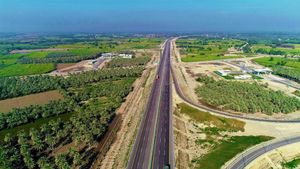On February 13, radio enthusiasts around the world will come together to celebrate World Radio Day, a recognition of the significant role of radio as a medium of communication and cultural preservation. This year’s events, particularly prominent in the northeastern regions of India, exemplify the transformative power of radio and its adaptation to modern technology.
To kick off the festivities, Bamboosa Library and Akashvani Tezu recently conducted a spirited quiz competition for college students at Lohit district, commemorated on February 12. The event marked the excitement and engagement surrounding World Radio Day, which occurs annually on February 13. According to local reports, the first prize was awarded to the team from Denning College for Teacher Education (DCTA), featuring members Omi Lego, Sonam Sah, and Roshni Kumari. The runners-up included another DCTA team and participants from Indira Gandhi Government College’s commerce department, underscoring the competitive spirit among the youth.
Joining the celebrations, All India Radio (AIR) Guwahati has organized a day-long program aptly themed ‘Radio and Climate Change’. This initiative aims to blend entertainment with education by showcasing the talents of announcers through singing, dancing, acting, and reciting poetry. Indrajit Das, transmission executive of AIR Guwahati, remarked, “We used to broadcast programmes through tapes and gramophone records... we have to move forward with the changing time; only then can we connect with the listeners.” The program will also include discussions led by retired professor Abani Kumar Bhagabati, exploring the pivotal role radio plays in raising climate awareness.
AIR Guwahati has not only evolved its broadcasting methods but also embraced digital strides, providing content via Facebook and YouTube as well. “Radio is not in the race for TRP but has been working as a responsible medium for the people,” Das elaborated, highlighting radio’s leading position as a trustworthy information source.
The concept of World Radio Day traces back to 2011, when it was declared by UNESCO and later adopted by the United Nations General Assembly. The date was deliberately selected to coincide with the founding of United Nations Radio on February 13, 1946, marking the inception of radio as a tool for international dialogue and cooperation, particularly significant during the aftermath of World War II.
Radio has dramatically transformed since its inception, shifting from analog broadcasts to digital formats. During recent discussions, radio jockeys across various stations shared personal experiences about the evolution of their jobs, highlighting the bridge of connection established through digital media. RJ Swathi from 98.3 Mirchi expressed joy over these developments: “Now, an RJ isn’t just someone you hear. They’re also someone you see and who talks to you and replies to your comments.” Such sentiments reflect the modern radio personality's prominence, where the boundaries between listener and broadcaster have blurred.
Combining entertainment with audience interactivity has contributed to radio's enduring charm, especially among younger demographics. RJ Surya noted the challenges faced when transitioning to online platforms. “When we RJs started turning up online... But we picked up the trade in no time,” he recalled. Many listeners, such as 20-year-old Saaradaa, appreciate the immediacy and relatability of radio, saying, “It feels as if someone is really talking to you.” This connection has become increasingly important for listeners seeking companionship through audio amid their busy lives.
Listeners resonate with emotional connections to the medium, as Swapna, 38, reflects, “Sometimes, we don’t... each and every moment is a new experience.” These testimonials reinforce the belief among many individuals, especially younger audiences, who regard radio as indispensable even amid the digital whirlwind surrounding it. Feedback from this generation highlights radio’s timeless capacity to evoke nostalgia and deliver immediate, trustworthy information.
The energetic activities surrounding World Radio Day celebrations not only showcase talent but also revive appreciation for radio’s rich history. With various competitions and discussions planned, these events serve as both a tribute to radio's past and recognition of its future. Radio continues to connect people across distances, embodying creativity and community spirit, proving its relevance even as technology continues to evolve.
Through innovative adaptations to the digital age and enduring connections with audiences, radio remains far from obsolete. With World Radio Day on the horizon, communities unite to celebrate and recognize the impact radio has woven throughout society.



